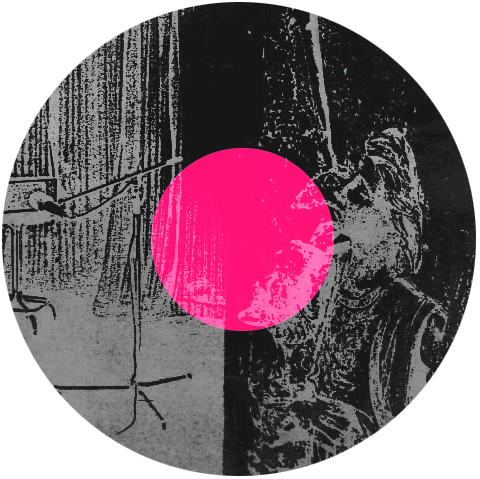5 Jul 2020
Leaden Light of the Proletariat: Beckett and Working-Class Politics

Halfway through Samuel Beckett’s excellent Malone Dies, the titular character details a highly evocative visual metaphor that quickly gets right to the heart of the Beckettian project:
… I feel it my duty to say that it is never light in this place, never really light. The light is there, outside, the air sparkles, the granite wall across the way glitters with all its mica, the light is against my window, but it does not come through. So that here all bathes, I will not say in shadow, nor even in half-shadow, but in a kind of leaden light that makes no shadow, so that it is hard to say from what direction it comes, for it seems to come from all directions at once, and with equal force. (p.58)
You can picture it in your mind’s eye: a dull light that illuminates basically nothing apart from indiscriminate amorphous pools of dark colour that we can barely perceive, that for all intents and purposes is not “light” at all. And yet, this is not simply darkness either… there is something that we sense, but without any of the clarity that light is supposed to bring…
It is not just Malone’s room that is bathed in this eerie “leaden light”, which he evokes multiple times throughout the book: it is seemingly the entirety of Beckett’s oeuvre. Beckett’s characters are often decrepit, impotent, forgetful and elderly figures that stalk not just at the fringes of society (for example in mental institutions) but also at the fringes of the human itself. Constantly reflecting on and editing the texts which they are purportedly the author, flitting from one topic to the next, his characters seem to lack any of the regularity or constancy that define human interiority. And yet, they stubbornly remain human: with a dark and bleak sense of humour, they continue to think, walk about, and even have sex. Much like the leaden light, we can grasp at “something” with Beckett’s characters, but paradoxically because of this, they remain unclear, dark, “nothing”.
It is precisely this commitment to the eerie, contradictory fringes that makes Beckett’s books often challenging and difficult to read: absent a plot or characters in any substantial or coherent sense, the major footholds a reader typically depends on when reading are gone. For most people, this amounts to a cardinal sin, and an immediate turn-off: why read a book where nothing happens? Where we know essentially nothing about the characters involved? Why are there pages, indeed a whole physical book, when really there should be none? Indeed, for most people these are entirely legitimate questions, and the “common sense”, instinctual reaction to Beckett’s works would be to stop reading after 20 pages and tell everyone you know how boring the book was. But such criticisms, rather than seriously invalidating Beckett’s works, actually demonstrate the radicality of the philosophical claims they make on us. For in order to seriously engage with and enjoy them, Beckett’s works demand nothing less than this: that we adopt a whole new ontology, an ontology right at the limits of ontology itself.
The central philosophical question prompted by Beckett is this: how do we think nothingness without turning it into a “something”? How do we think a being that, paradoxically, is nothing? What kind of “being” is the leaden light?
Beckett’s works themselves don’t exactly answer this (non-)philosophical question, but we do get a hint at an answer in a scene from the novel prior to Malone Dies, Molloy. In this scene, the hard-headed investigator Moran, who is given the task of finding Molloy and told to bring his son Jacques along, sits down to dinner and is frustrated with his son’s tardiness, for they need to leave soon:
Where is Jacques? I said. [His maid, Martha] shrugged her shoulders. Detestable slavish gesture. Tell him to come down at once, I said. The soup before me had stopped steaming. Had it ever steamed? She came back. He won’t come down, she said. I laid down my spoon. Tell me, Martha, I said, what is this preparation? She named it. Have I had it before? I said. She assured me I had. I then made a joke which pleased me enormously, I laughed so much I began to hiccup. It was lost on Martha who stared at me dazedly. Tell him to come down, I said at last. What? said Martha. I repeated my phrase. She still looked genuinely perplexed. There are three of us in this charming home, I said, you, my son and finally myself. What I said was, Tell him to come down. But he’s sick, said Martha. Were he dying, I said, down he must come. Anger led me sometimes to slight excesses of language. I could not regret them. It seemed to me that all language was an excess of language. Naturally I confessed them. I was short of sins.
What Beckett is seemingly targeting here is the idea that there is a primary “economical” language that “gets to the point” of what is expressed, and then a secondary “descriptive” or flowery language that is laid on top of the primary language, which simply exists to enliven or add detail to it. (It is this kind of framework that may inform the simplistic criticisms of Beckett’s work we noted above: if nothing really happens in Malone Dies, then why does it need to be 144 pages long? Sure, his work is about thinking nothingness, existentialism, yadda yadda yadda, but could he not have made the point a bit more succinctly?)
Instead, as Beckett via Moran argues, it is the secondary kind of language that comes “first”: all language is an excess of language, and any kind of illusion of “economical” language that “gets to the point” is simply a retroactive subtraction from a primary excess1. That’s a pretty jargon-heavy sentence, so to understand this more it’s fruitful to begin with a Wittgenstein quote made popular by its inclusion in Maggie Nelson’s The Argonauts:
the inexpressible is contained – inexpressibly – in the expressed!
In other words, we are always driven to language-use by an inexpressible, impersonal intensity which we then try to articulate with words, language, and gestures. This is most evident when these articulations are unsuccessful: we are “lost for words”, we cannot say what we are trying to say, even though we know in an almost instinctual way that we have something to say. But rather than only applying when it fails, such failures afflict all language-use. This is because all symbols have a negative character: we employ symbol and words to stand in and speak for things, even though they themselves are not those things, and can never do full justice to those things’ existence. (The word “cat” is not the actual cat from the flat next door, but yet it still must signify a certain “cat-ness”, through which it must have some kind of relation to the specific cat.) And it is in this sense that all language is an excess of language, an excess that has a double character: first, language is always a “more-than”, always using more words than it needs to do make its point; and second, it is always simultaneously a “less-than”, never quite reaching the moment where it absolutely faithfully expresses the intensity behind it. What Beckett demonstrates about the void at the heart of language, the emptiness that it tries to fill, therefore, is that rather than being a pure negativity, it is instead a kind of excess beyond language, which language can never articulate positively but only approach negatively.
In this sense, there is an interesting crossover between Beckett and negative theology. As Eugene Thacker details in Chapter 2 of his excellent book After Life, in negative theology – for example in Pseudo-Dionysius’ The Mystical Theology – God or the divine is said to be nothing, nihil, because its being is completely and utterly beyond human perception and imagination. It is “nothing” because it is not a crude “thing”, instead located beyond “thing-ness” – Being – altogether.
Negative theology thus argues that we can never positively know God; instead, we can only reach and know God by progressively stating what it is not. As Thacker notes, negative theology therefore presents a contradictory form of negation which he terms via superlativa or superlative negation2: a negating movement which, by constantly elucidating what God is not, paradoxically brings us closer to the superlative “divine darkness”. As Thacker puts it:
In this superlative negation, the divine is defined as being negative because it is defined as being beyond every possible conceptualization, thereby always receding into a sort of dark, opaque nether region that later authors such as Eriugena will simply call nihil. (p.43)
Beckett’s “leaden light” has a similar character: it is a void, a negativity, a bleak darkness, but precisely because it is paradoxically also a kind of superlative excess, a “beyond”, a superlative negativity.

*
Are these simply “aesthetic” or “theological” issues? Should you give up reading this post if you haven’t read Beckett, don’t care about modernist literature, or even fiction at all? No – because Beckett’s “leaden light” and overall philosophy are invaluable conceptual tools that can help us think through and understand some complex political issues that are often misunderstood. In particular, it can help us understand the precise nature of the working-class subject, and thus help clarify the goals and starting points of a working-class politics.
My argument here3 begins with a passage from the AngryWorkers collective’s recent book, Class Power on Zero Hours, which was shared by Laura on Instagram and caught my eye. AngryWorkers are a group of disillusioned leftists who in 2014 moved to a suburb in West London with the explicit intention of getting jobs in various distribution centres and food processing plants and organising slow-downs and strikes, in order to, in their words, “rebuild class power and create a small cell of a revolutionary organisation”. Class Power details the results of these organising efforts, and outlines the group’s political approach. As the aforementioned passage reads, from the introduction of the book:
We suggest a different kind of class politics, one that is embedded in the daily lives of working class people. It may sound simple, but the fact that many on the left have no concrete relationship to working class areas or working class people is a big problem. You end up either lamenting their status as victims of capitalism’s deindustrialised past (as much of the Brexit voters are); as robots (as Amazon’s tech-savvy warehouse workers are); slaves (as many low-waged workers in modern workplaces are); or destitute (as the rising numbers of homeless and those affected by benefit cuts are). How are robots, slaves, the destitute and victims supposed to be a force worth reckoning with? This totally disenfranchised notion of the working class will not allow us to unearth its revolutionary potential. This is exactly what the ruling class wants.
The interesting question this raises is: what “is” the working class? AngryWorkers correctly denounce the view of the working class as a pure lack or absence, a “not-“ in the form of not-rich, not-clean, not-polite, not-propertied, which is not only philosophically incorrect but politically robs the working class of all agency. But if the working class are not a “not-“, then what are they? How are we to conceive of working-class subjectivity and agency?
As the above implies, the answer is not to be found in transforming the working class into some positive “substance”. This is the dominant – or should I say liberal – conception of class: there are various different categories of class (working class, middle class, upper class) with various different positive attributes (e.g. working class: rents their house, upper class: owns a successful business), and we slot individual people into these categories based on what positive attributes most characterise their life. The mistake this conception makes it that it assumes that each class exists in the same way, i.e. they are all made of the same “substance”, they just differ because they have different attributes/characteristics. In other words, we can determine the essence of each class by simply noting and stating its positive characteristics.
The fundamental error of this liberal conception of class is, of course, that the working class “essence” fundamentally does not exist in the same kind of way as the bourgeois “essence”. For the bourgeoisie, the world that surrounds them seems to entirely cater to and facilitate their bourgeois being: if you have the money, there are more then enough opportunities for you to use it to make more of it. With the entire system catered to them (and not just economically; the dominance of privately educated voices in the media also “culturally” caters to their existence), the bourgeois subject grows up with a fundamental personal sense of social, and above all ontological, confidence4. When bourgeois desires perfectly correlate with the “objective” world, there is no cause for anxiety – the bourgeois is at home in the public world. In a sense, then, we can quite literally take the bourgeois at their word: what they positively say or do (ruthlessly seek out profit) accurately surmises what they are.
The working class, however, owing to its material exploitation and appropriation by the bourgeoisie, lacks this ontological security: the world does not present itself to them positively (“Look at all the things you can do with your money!”) but negatively, as a world of limits (“You did not get this job because you are too uneducated and lack a degree”, “you cannot speak up at work because you are just a cleaner”, “you cannot make money dealing drugs even though it may be a rare effective route out of poverty for you because it is criminal” etc.). As the Marxist concept of “alienation” suggests, the working class are thus quite literally extra-terrestrial alien beings stalking the world of the bourgeois: hence the prevailing affect of “imposter syndrome” and inferiority when a working-class person reaches above their prescribed station and gets a job in academia or the media – can the alien pass as a bourgeois human?
Owing to this alienated character, this need to “pass” in the world of the bourgeois, the working-class “essence” cannot be given the form of a set of simplistically positive characteristics, as with the bourgeois. It is precisely this fact that dismantles the Faragian argument that ordinary working people are racist, sexist and nationalistic (and, implicitly, thick), and so any “true” political representation of the working class must simplistically pander to and mimic these viewpoints, rather than adopt the values of the “metropolitan elite”. Now, yes, you can find plenty of polls that find that racist, sexist, nationalistic viewpoints are shared by large proportions of the working class. But, as I have been arguing here, these statistics and viewpoints cannot be said to truly represent the “essence of the working class” because the working class “essence” does not take the form of a positive, full, presence.
Consequently, one cannot say that the racist/sexist/nationalistic viewpoints identified in these polls are inherently “working-class” in themselves. In fact, it’s the opposite: working-class people come to identify with and use nationalistic arguments because that is the dominant reality of the phantasmatic bourgeois world they find themselves existing in. In expressing racist and nationalistic sentiments, therefore, members of the working class are not expressing their true, inner “working-class nature”, but instead regurgitating lines fed to them from the outside by their bourgeois masters. While one can listen to a manager who is firing us from our job because “the business comes first” or “cuts are necessary” and correctly say “God, that’s such a Tory/bourgeois thing to say, what a shit”, one cannot listen to a destitute old man talking about kicking immigrants out the country at a food bank and say “God, poor/working-class people are such idiots” without being a condescending, classist, and above all incorrect prick.
Consequently, instead of a subject that exists with a full positivity and a genuine means of self-expression, we have to conceive of the working class as a subject akin to Beckett’s “leaden light”: a “nothing” that still, in some eerie sense, persists in being “something”. This is aptly demonstrated by the process of working-class self-realisation or consciousness-raising: by talking with other workers or doing theoretical reading and reflection, the working-class subject manages to overcome “false consciousness” and pierce the bourgeois illusion of appearances. But, pulling back the illusory curtain, the working-class subject does not find anything: there is no “true working-class nature/heritage/roots” behind it waiting to be found all along5. And it is precisely this eerie strangeness, this leaden light behind the curtain and the dislocation of the enlightened working-class subject within it, that defines working-class subjectivity6.
The problem this presents us with is: if working-class subjectivity is fundamentally eerie or Beckettian, then what does working-class self-expression look like? Surely the answer isn’t to give up the label of working class entirely? What can the working class do?
Perhaps the answer, as hinted above, lies in negative theology and the via superlativa: the only way of “truthfully” expressing and asserting the eerie void of working-class subjectivity and political agency is to express what it is not, or rather, against. This has to be precisely understood, however, for as the AngryWorkers passage cited above argues, it can all too easily slip into positing the working class as simply the negative opposite of the bourgeois, leading to the working class being labelled as “victims”, “robots” or “slaves”. Ironically, we can say that the problem with this is that it doesn’t go far enough: it freezes the negativity of the working-class subject into an impotent “thing”; it uses the negativity only as a means to reach an ultimate positivity or affirmation. Instead, we should heed the words of The Communist Manifesto: “Communists everywhere support every revolutionary movement against the existing social and political order of things.” Communism, as the true political expression of the working class, takes the form of an infinite, superlative negation against the dominant order of things everywhere, to the point where it even eventually destroys the working class itself, through the abolition of capitalism and the class structure. Rather than positing a positive substance that must be protected and given certain rights, then, the proper political expression of the working class always takes the form of an antagonism; and, as Beckett’s contradictory figure of the leaden light indexes, this negation is always simultaneously a kind of creation – the planting of the seeds of a different world which is currently beyond our imagination.

-
Deleuze and Guattari make a similar argument in the “Apparatus of Capture” plateau of A Thousand Plateaus, regarding surplus labour vs. necessary labour. ↩
-
Eugene Thacker, After Life, 2010, section 2.4.2, specifically p.43 ↩
-
What follows builds off what I was discussing in issue 16 of my lockdown recs newsletter. ↩
-
This argument is greatly inspired by k-punk’s posts on the topic, “Epistemic Privilege of the Proletariat” and “Punishment Enough” ↩
-
This was nicely demonstrated by a recent post from the Working Class History project about King Henry VIII’s vagrancy laws which kicked people who were not in wage labour off communal land, and through authoritarian punishments forced them into wage labour. As they argue, what this early capitalist process of primitive accumulation demonstrates is that the working class is not a “natural” creation but utterly artificial. The process of working-class self-realisation is thus akin to how we feel when reading a science fiction novel and learning that one of the characters we thought was a human was an intelligent automaton all along: we feel an eerie sense of vertigo, of groundlessness, confronted with an abyss at the heart of being. ↩
-
One can make parallels here with other oppressed subjectivities, with the arguments above greatly echoing the work of Frantz Fanon and Fred Moten’s work on blackness, for example. In The Undercommons with Stefano Harney, for instance, he terms Blackness as “the site where absolute nothingness and the world of things converge” (p.95). See also Moten’s essay “Blackness and Nothingness”, where he describes blackness as “the place that has no place”, available free here. ↩
